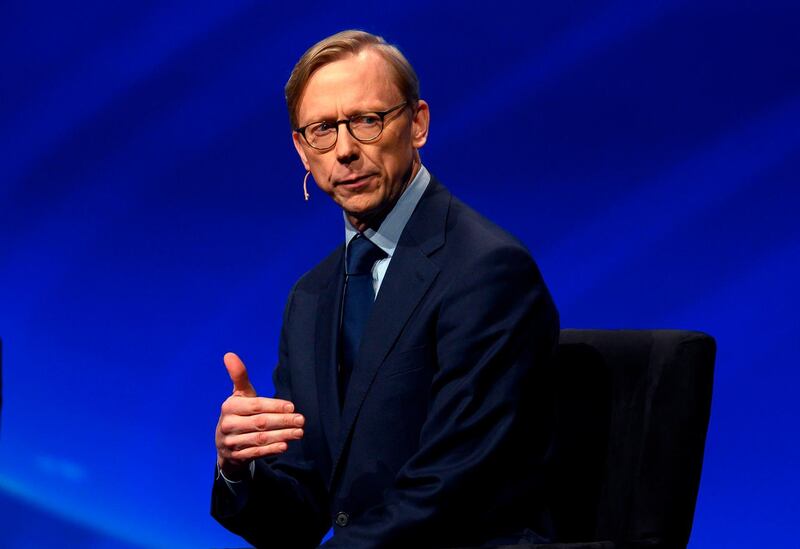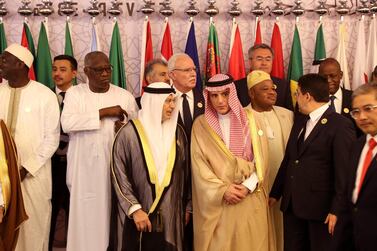The US will respond with military force if it or its interests are attacked by Tehran, the special representative on Iran said on Thursday.
At separate events, special representative Brian Hook and National Security Adviser John Bolton said sending a US aircraft carrier and B-52 bombers to the Middle East had been an effective deterrent.
In London, Mr Bolton said the US would present evidence to the UN Security Council early next week that Tehran was behind attacks on four tankers off the coast of the UAE.
He accused Iran of orchestrating the attacks on Wednesday.
Meanwhile, Mr Hook said Washington was expecting the results of the UAE, Norway and Saudi investigations into the attacks soon and would wait until then to respond.
"Once we have a fuller picture of the facts we'll be in a position to discuss the proper response, but that's something that we would be doing in concert with Norway, Saudi Arabia and the UAE," he said at a briefing.
Mr Bolton and Mr Hook said that the US was not seeking regime change in Iran, but the threat from Tehran was not over.
Mr Bolton warned it would be a "big mistake" if Iran or its surrogates attacked US interests.
Mr Hook said he believed Tehran had "got the message" for now and that many of the attacks the US feared had not eventuated.
The US moved an aircraft carrier, the USS Abraham Lincoln and the B-52 bombers to the Gulf this month in response to increasing tension with Iran.
It announced it will also send 1,500 more troops to the region.
Mr Hook said the renewal of sanctions against Iran after the US withdrew from a 2015 nuclear deal was "working by nearly every measure" to contain Iran and its proxies for their behaviour in the region.
The economic bans the US has placed on Iran is working against Iran's "favourite son" Hezbollah, Hamas, militia groups and the Assad regime in Syria as funding from Iran dries up, he said.
Mr Hook said this was shown by a request from Hezbollah leader Hassan Nasrallah in March for followers to donate money to the organisation.
___________
[ Saudi Arabia asks nations to respond to Iran with 'firmness' ]
___________
He said the US would sanction any efforts to import Iranian crude beyond the cap previously agreed to, and there would be no more oil waivers granted. Eight economies, including China and India, were given waivers.
Turkey ended Iranian oil imports last week after a push for an extension to its waiver was denied by the US.
The sanctions on Iranian oil would cost the regime $50 billion (Dh183.65bn) in revenue, Mr Hook said.
Mr Hook said US President Donald Trump was in favour of a new nuclear deal with Iran.
This week Mr Trump backed an offer by Japanese Prime Minister Shinzo Abe to mediate between the two rivals.
"I do believe Iran would like to talk and if they'd like to talk, we'll talk also," he said.
The Iranians have been less enthusiastic. Foreign Minister Javad Zarif said the Trump administration needed to show its intentions with "actions, not words".
Iran's Foreign Ministry spokesman, Abbas Mousavi, said his government would "wait and see" before taking steps to negotiate.
Ayatollah @khamenei_ir long ago said we're not seeking nuclear weapons—by issuing a fatwa (edict) banning them.#B_Team's #EconomicTerrorism is hurting the Iranian people & causing tension in the region. Actions—not words—will show whether or not that's @realDonaldTrump's intent
— Javad Zarif (@JZarif) May 27, 2019
The US has 12 focus points in its future relationship with Iran, including the arbitrary detention of dual nationals, Iran's ballistic missile programme and regional aggression, Mr Hook said.
Any future agreement would have to deal with these issues better than the 2015 pact to which the EU and Iran still subscribe, he said.
"One of deal's many failings is that it has reduced and misled people into thinking that the only threat to peace and security that Iran presents is this nuclear programme," Mr Hook said.
"The Iran nuclear deal is silent on Iran's missiles and on the regional aggression."
The US may be willing to come to the negotiating table but the hard speech is not letting up.
Mr Hook accused Iranian President Hassan Rouhani and supreme leader Ayatollah Ali Khamenei of running a kleptocracy.
"It is a corrupt religious mafia that robs its own people blind to fund a very violent and ideological foreign policy," he said.
Early on Friday Gulf leaders meeting at an emergency summit in Makkah issued a communique in which they condemned the "acts of sabotage" on four tankers in the UAE's regional waters as well as drone attacks on Saudi Arabia's oil facilities.







